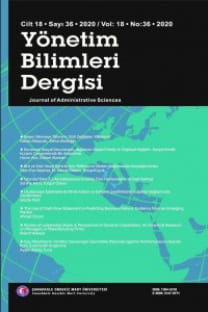KAPALI DÖNGÜ TEDARİK ZİNCİRİ UYGULAMALARINI ETKİLEYEN FAKTÖRLERİN YORUMLAYICI YAPISAL MODELLEME VE MICMAC YÖNTEMLERİ İLE ANALİZİ
Kapalı Döngü Tedarik Zinciri Yönetimi, Yorumlayıcı Yapısal Modelleme, MICMAC Yöntemi
ANALYSIS OF FACTORS THAT AFFECT CLOSED-LOOP SUPPLY CHAIN PRACTICES USING THE INTERPRETIVE STRUCTURAL MODELING AND MICMAC METHODS
___
- Alvarez-Gil, M.J., Berrone, P., Husillos, F.J. ve Lado, N. (2007). Reverse Logistics, Stakeholders’ Influence, Organizational Slack, and Managers’ Posture. Journal of Business Research, 60 (5), 463-473.
- Bhatia, M.S. ve Srivastava, R.K. (2019). Antecedents of Implementation Success in Closed-Loop Supply Chain: An Empirical Investigation. International Journal of Production Research, 57(23), 7344-7360.
- Bhatia, M.S., Jakhar, S.K., Mangla, S.K. ve Gangwani, K.K. (2020). Critical Factors to Environment Management in A Closed Loop Supply. Journal of Cleaner Production, 255, 1-9.
- Clifford. D,C., Esper, T. ve Mollenkopf, D. (2009). Leveraging Closed-Loop Orientation and Leadership For Environmental Sustainability. Supply Chain Management: An Internetional Journal, 14(2), 87-98.
- Çakırlı, M. Y., Usta, S.K. ve Serdarasan, Ş. (2020). Kurumsal Kaynak Planlama Uygulamalarında Karşılaşılan Engellerin Yapısal Modellemesi ve Analizi. Pamukkale Üniversitesi Mühendislik Bilimleri Dergisi, 26(4), 799-811.
- Çalışkan, A. (2020). Akıllı Liman Dönüşümünde Zorlukların Yorumlayıcı Yapısal Modelleme ile Değerlendirilmesi. Beykoz Akademi Dergisi, 8(1), 305-320.
- Dutta, P., Das, D., Schultmann, F. ve Fr€ohling, M. (2016). Design and Planning of A Closed-Loop Supply Chain With Three Way Recovery and Buy-Back Offer. Journal of Cleaner Production, 135, 604-619.
- Govindan, K., Soleimani, H. ve Kannan, D. (2015). Reverse Logistics And Closed-Loop Supply Chain: A Comprehensive Review To Explore The Future. European Journal of Operational Research, 240, 603–626.
- Guide, V. D. R. ve Van Wassenhove, L. N. (2009). The Evolution of Closed-Loop Supply Chain Research. Operations Research, 57(1), 10–18.
- Jayaraman, V., Guide, Jr., V.D.R. ve Srivastava, R. (1999). A Closed-Loop Logistics Model for Remanufacturing. Journal of the Operational Research Society, 50, 497–508.
- Jayaraman, V. (2006). Production Planning for Closed-Loop Supply Chains with Product Recovery and Reuse an Analytical Approach. International Journal of Production Research, 44(5), 981–998.
- Jindal, A. ve Sangwan, K.S. (2014). Closed Loop Supply Chain Network Design and Optimisation Using Fuzzy Mixed Integer Linear Programming Model. International Journal of Production Research, 52(14), 4156–4173.
- Kannan, G., Sasikumar, P. ve Devika, K. (2010). A Genetic Algorithm Approach For Solving A Closed Loop Supply Chain Model: A Case of Battery Recycling. Applied Mathematical Modelling, 34(3), 655-670.
- Kapetanopoulou, P. ve Tagaras, G. (2011). Drivers and Obstacles of Product Recovery Activities in The Greek Industry. International Journal Operations Production Management, 31(2), 148-166.
- Kazemi, N., Modak, N.M. ve Govindan, K. (2018). A Review of Reverse Logistics and Closed Loop Supply Chain Management Studies Published in IJPR: A Bibliometric and Content Analysis. International Journal of Production Research, 57(15-16), 4937-4960.
- Mangla, S., Madaan, J., Sharma, P.R.S. ve Gupta. M.P. (2014). Multi-objective Decision Modelling Using Interpretive Structural Modelling for Green Supply Chains. International Journal of Logistics Systems and Management, 17(2), 125–142.
- Mangla, S.K., Govindan, K. ve Luthra, S. (2016). Critical Success Factors For Reverse Logistics in Indian Industries: A Structural Model. Journal of Cleaner Production, 129, 608-621.
- Mangla, S.K., Luthra, S., Mishra, N., Singh, A., Rana, N.P., Dora M., & Dwivedi, Y. (2018). Barriers to Effective Circular Supply Chain Management in A Developing Country Context. Production Planning & Control, 29(6), 551-569.
- Mathiyazhagan, K., Govindan, K., NoorulHaq, A. ve Geng, Y. (2013). An ISM Approach for the Barrier Analysis in Implementing Green Supply Chain Management. Journal of Cleaner Production, 47, 283–297.
- Liang, Y., Wang, H. ve Zhao, X. (2022). Analysis of Factors Affecting Economic Operation of Electric Vehicle Charging Station Based on DEMATEL-ISM. Computers & Industrial Engineering, 163, 1-11.
- Luthra, S., Garg, D. ve Haleem. A. (2015). An Analysis of Interactions Among Critical Success Factors to Implement Green Supply Chain Management Towards Sustainability: An Indian Perspective. Resources Policy, 46, 37–50.
- Rahman, S. ve Subramanian, N. (2012). Factors For Implementing End-Of-Life Computer Recycling Operations in Reverse Supply Chains. International Journal Production Economics, 140(1), 239-248.
- Raut, R.D., Narkhede, B. ve Gardas, B.B. (2017). To Identify the Critical Success Factors of Sustainable Supply Chain Management Practices in The Context of Oil And Gas Industries: ISM Approach. Renewable and Sustainable Energy Reviews, 68, 33–47.
- Ravi, V. ve Shankar, R. (2005). Analysis of Interactions among the Barriers of Reverse Logistics. Technological Forecasting and Social Change, 72(8), 1011–1029.
- Resmi Gazete. (22.05.2012). Atık Elektrikli ve Elektronik Eşyaların Kontrolü Yönetmeliği. Resmi Gazete Sayısı: 28300.
- Resmi Gazete. (30.12.2009). Ömrünü Tamamlamış Araçların Kontrolü Hakkında Yönetmelik, Resmi Gazete Sayısı: 27448.
- Resmi Gazete. (24.08.2011). Ambalaj Atıklarının Kontrolü Yönetmeliği, Resmi Gazete Sayısı: 28035.
- Şengül, Ü. (2009). Kapalı Döngü Tedarik Zinciri Kavramı, İşleyişi ve İşletme Modelleri. Kafkas Üniversitesi Sosyal Bilimler Enstitüsü Dergisi, 4, 125-139.
- ISSN: 1304-5318
- Yayın Aralığı: 4
- Başlangıç: 2003
- Yayıncı: Yönetim Bilimleri Dergisi
TÜRKİYE HANEHALKI ALKOLLÜ İÇECEK TÜKETİMİ KARAKTERİSTİKLERİNİN BELİRLENMESİ ÜZERİNE BİR ARAŞTIRMA
İŞ BECERİKLİLİĞİ VE ÇALIŞAN İYİ OLUŞU ÜZERİNE NİCEL BİR ARAŞTIRMA
Ali Şahin ÖRNEK, Selda TOPKAYA, Fuat Fırat ÇEVİK
YEŞİL EKONOMİDE İKLİM ADALETİNİN VE YOKSULLUĞUN BİRLİKTE ELE ALINMASI ÜZERİNE BİR İNCELEME
YEŞİL MUHASEBE VE UYGULAMA ÖRNEKLERİ ÜZERİNE BİR ÇALIŞMA
YEŞİL HİZMET İNOVASYONU: BANKACILIK SEKTÖRÜNDE KALİTATİF BİR ARAŞTIRMA
Minire KIRBAŞLI, Zehra Binnur AVUNDUK
OECD ÜLKELERİNDE CİNSİYET EŞİTSİZLİĞİNİN GELİR DAĞILIMI ÜZERİNE ETKİSİ
DÖNGÜSEL EKONOMİ ÇERÇEVESİNDE TÜRKİYE’DE ATIK İTHALATININ BELİRLEYİCİLERİ: ÇEKİM MODELİ ANALİZİ
BİYOKORSANLIK SORUNU VE TÜRKİYE’DE BİYOKORSANLIĞA YÖNELİK POLİTİKALAR
